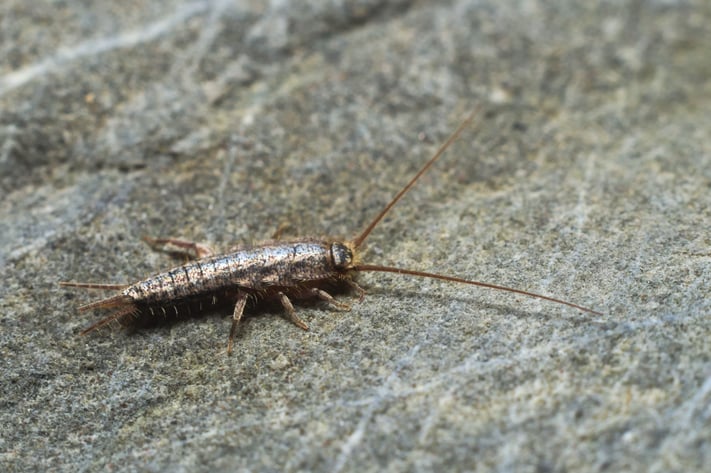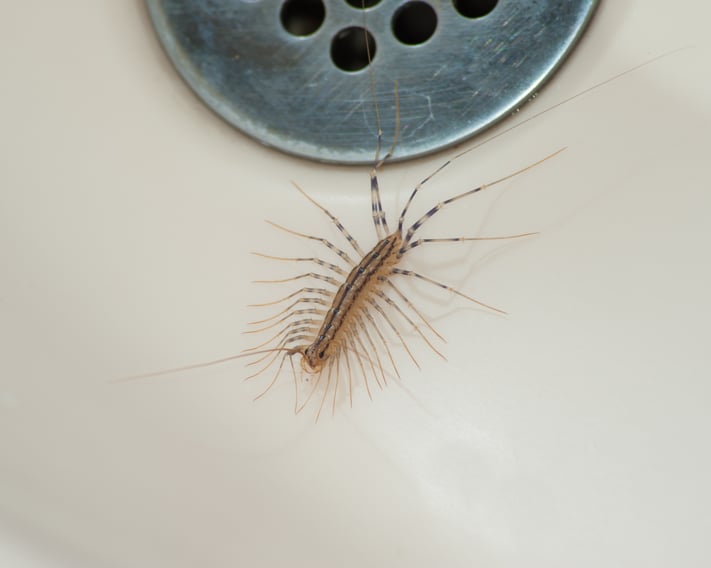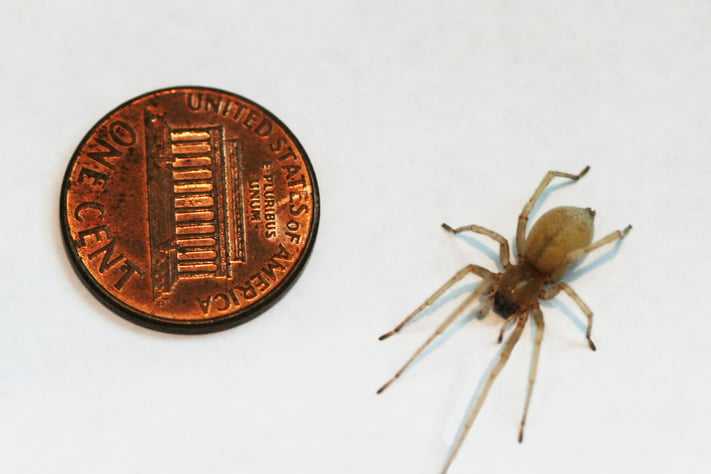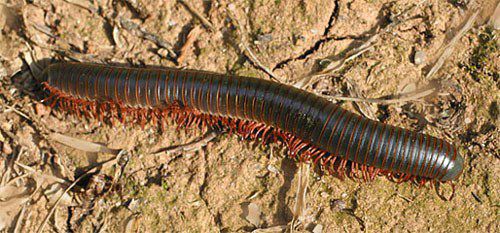Your basement can become a spooky place when it’s full of insects that you do not wish to encounter. The mystery of basement bugs in your home can go unsolved due to the strong aversion and fear some people have to pests they can’t identify. If you are too frightened to visit your basement, it will remain untreated and can play host to additional pest infestations. Cooper can help manage the levels of pest activity in your home and basement so you can enjoy every room of your house in peace.
Basement Bug Identification
Silverfish

Silverfish are about ½ to ¾ of an inch long and can be gray or brown. They can be found in basements, bathrooms, and garages, searching for moisture in a dark space. Since silverfish are nocturnal, they can go for a while without being noticed and unfortunately for homeowners, they can reproduce quickly, which allows them the potential for exponential growth while residing in your home.
Although silverfish don’t pose any harm to humans, they can cause extensive damage to paper products, book bindings, clothing, and even contaminate food. If you search online, you can dig up some home remedies for silverfish control, but unfortunately, without a customized plan to target their breeding source, all you are accomplishing is killing visible silverfish as they appear. Killing them one by one will not resolve the ongoing issue. Professional pest control is needed to completely control silverfish infestations.
Centipedes

Centipedes are easily identified by their multitude of legs and ability to quickly dart around rooms. They are especially drawn to basements because of the moist, dark environment that often exists. Adult centipedes are yellowish to dark brown, often with dark markings, and up to two inches long. The body is flattened with 15-177 body segments which typically have one pair of legs each. They have one pair of slender antennae. Sealing off possible entry points such as cracks and crevices in the foundation of your home, pipes, windows, and doors can prevent infestations.
Spiders

Cellar Spider Pictured Above
Spiders are usually the first thing that comes to mind when you think about bugs in your basement. There are several types of spiders that are commonly found in New Jersey and Pennsylvania, which include the wolf spider, brown recluse spider, and cellar spider. Spiders are drawn to basements due to the dark, damp conditions that exist. In general, spiders have 8 legs (four pairs). They have two body regions: a cephalothorax (fused head and thorax) and an abdomen, which are joined together by a narrow waist. Most spiders have six or eight simple eyes in various arrangements. Spiders spin their webs by producing silk secreted as a liquid that hardens on contact. They are actually beneficial because they eat almost every other tiny bug in your basement. If you are creeped out and cannot stand their presence, Cooper can eliminate and control spider populations within your basement and home.
Crickets
Camel crickets (cave crickets), house crickets, and spider crickets are among some of the most prominent basement bugs. Most clients can easily identify cricket infestations by hearing the loud chirping at night time that is unique to crickets alone. Generally, crickets range between 1/2 – 2 inches long, with black or brown coloring, some with banded patterns across their abdomen. Crickets can cause damage to clothing by creating large holes in fabric and synthetic materials. This type of activity can exponentially increase as the weather changes from warm to cold. Crickets migrate indoors to seek shelter and most importantly, moisture, in potentially very large groups in the thousands. You are most likely to find these pests hiding in dark, damp environments such as basements and crawl spaces.
Millipedes

Millipede Photo Credit: Hilton Pond Center
Millipedes are usually misidentified as centipedes. Unlike centipedes, millipedes have legs in pairs except for their first three legs which are not paired. They are slow moving and tend to curl up into a spiral when disturbed. Millipedes need a lot of moisture so they can usually be found in hiding under objects during the day and in areas where there is decaying plant life—like compost—which is their primary food. Millipedes tend to enter structures accidentally and are completely harmless.
How can I get rid of bugs in my basement?
Getting rid of bugs in your basement means taking each pest into account individually. Each pest needs their own sort of basement bug repellent plan to target their particular habits. Sean McGuire, Cooper Pest Solutions Director of Sales, suggests, “Reducing clutter and storage of cardboard boxes and reducing humidity and moisture levels throughout the home can help deter silverfish.” In regards to crickets, he states “Camel crickets are typically found in basements and crawlspaces, so the recommendation we make since they prefer a cool, damp area is using a dehumidifier.” However, if you want to remove pests and stop the breeding cycle from continuing, professional pest control is the best option.
Why do I have bugs in my house?
Bugs find their way into your basement by finding small cracks and crevices in the foundation of your home. If there are exposed pipes, windows, and doors in your basement, small entry points can exist if they are not properly sealed. Bugs can also make their way indoors if they are attached to or inside items that are brought into your home such as jackets, boxes, and bags.
Does humidity attract bugs?
Yes. A moist, dark environment is where basement bugs thrive. Bugs are attracted to moisture, so maintaining a balanced atmosphere in your home can dissuade them from infesting. Try using a dehumidifier and cleaning up wet spots from rain intrusion on a regular basis to remedy this situation.
Cooper can help
Cooper provides One-Time Services to target individual existing pest problems. Coverage under this program is 90 days. During this time frame, service calls are unlimited to ensure that we meet your expectations and control the pest activity in your home. One-Time Services target one single pest, as opposed to the home plans that target several bugs that you are likely to find in your basement.
The Home Traditional Plan is ideal for clients who have several pests in their basement such as centipedes, spiders, crickets, earwigs, and pill bugs. This plan provides year-round pest management with quarterly visits by our state certified technicians. If you find that you are seeing pest activity at any time during the year, you can call Cooper for unlimited, fast technician dispatch.
The Home Intensive Plan also provides year-round coverage against over 20 common household pests. Centipedes, spiders, crickets, earwigs, pill bugs, and silverfish. Silverfish are not covered under the Home Traditional Plan. Quarterly visits are performed and unlimited service calls are available in between.
Are you ready to protect your basement from bugs? Call us today at 1-800-949-2667 or fill out the contact for to the right for more information and to schedule a free, no-obligation pest evaluation.

